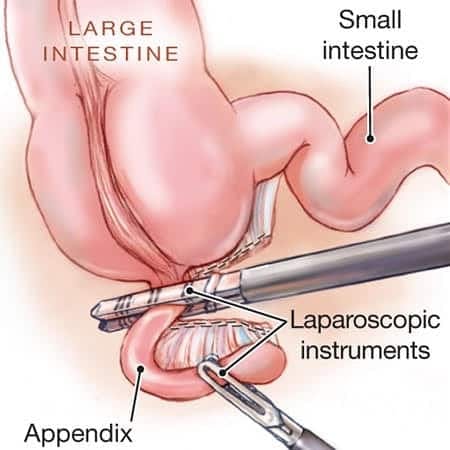Appendectomy

Appendectomy is the surgery to remove appendix. Another name of appendectomy is appendicectomy. It is usually carried out on an emergency basis to treat appendicitis. Appendicitis is the condition in which appendix becomes inflamed. It becomes inflamed because its tissues become infected with bacteria. Appendicitis can develop at any age, but it’s most common in young people.
Appendix is a small organ attached to the large intestine in the right lower side of the abdomen. It does not perform any vital function in the body. The exact biological function of the appendix is unknown.
Pain in the region of abdomen is usually confused with pain from acute appendicitis.
What causes appendicitis?
The exact cause of the appendicitis is not known. Since appendix is so close to the large intestine, it can become clogged with stool and bacteria. It usually occurs as a result of an obstruction in part of the appendix. Other times, mucus produced by the appendix can thicken and cause a blockage. This obstruction leads to the development of inflammation and swelling.
If you have appendicitis, your appendix must be removed right away. If left untreated, the appendix could rupture and cause infection called peritonitis. Peritonitis is the inflammation of membranes of abdominal wall and organs.
Diagnosis
Appendicitis can be difficult to diagnose because a number of other conditions can cause similar symptoms. The diagnosis of appendicitis is done on the basis of your symptoms, medical history and physical examination and is confirmed with an ultrasound, x-ray, or MRI exam. Some people develop pain similar to appendicitis, but it is caused by another reason like:
- Constipation
- Irritable bowel syndrome (IBS)
- Abdominal adhesions
Symptoms
Symptoms of appendicitis includes:
- Sudden pain that begins around the navel and then shifts to the lower right abdomen.
- Fever
- Constipation or diarrhea
- Loss of appetite
- Nausea and vomiting
- Swelling in the abdomen
Preparation
You will be given specific instruction from your surgeon about which medication you should or should not take prior to the surgery. Before surgery, doctor will want to know if patient smokes cigarettes, drinks alcohol or has a history of allergies. You will be asked not to eat or drink anything for at least 8 hours before the procedure. However, because an appendectomy is an emergency procedure, it may not be possible.
Prior to surgery, the patients may be treated with medications to reduce nausea or vomiting.
How the surgery is performed?
The appendix may be removed by an open method or the laparoscopic technique. Laparoscopy is usually the preferred method because the recovery tends to be quicker than with open surgery. Open surgery is carried out if the appendix has burst or access is more difficult.
Open appendectomy
In open surgery, the surgeon makes an incision about 2 to 4 inches long in the lower right side of the belly area and removes the appendix. The incision is then closed with stitches.
Laparoscopic appendectomy
Laparoscopic appendectomy is a minimally invasive surgery to remove the appendix. It involves the use of tiny camera called a laparoscope to help surgeon see inside the body.
The surgery is performed under general anesthesia, which means that you will be asleep during the surgery. The surgeon makes 3-4 incisions usually less than 2.5cm each in length. The laparoscope is inserted though these incisions into the abdomen, giving the surgeon a magnified views of the patients internal organs on the monitor. Other instruments are inserted to identify position and remove the appendix. The surgeon removes the appendix through one of the incisions. After the appendix is removed, surgeon may use dissolvable stitches to close the incision.
This procedure takes about an hour and the recovery time for laparoscopic appendectomy is also very short.
After surgery
After surgery, you will be moved to the recovery room to allow the anesthetic to wear off. The patient will most likely go home 24-36 hours after the surgery. If open or any complicated surgery is performed, it may take up to a week before you’re well enough to go home.
It usually takes a couple of weeks to make a full recovery after the appendix has been removed. The recovery time varies for each procedure although strenuous activities may need to be avoided for few weeks after surgery. For the first few days you may experience some pain and bruising. You may receive pain medication and it should be taken as prescribed. You’ll be advised about caring for your wound and what activities you should avoid.
DISCLAIMER
This web page provides general information and discussions about health, medicine and related subjects. The information and other content provided on this website, or in any linked materials, are not intended and should not be construed as medical advice, nor is the information a substitute for professional medical expertise or treatment.
The content is for information purpose only and is not a medical advice. Qualified doctors have gathered information from reputable sources; however Credence Medicure Corporation is not responsible for errors or omissions in reporting or explanations. No individual should use the information, resources and tools contained herein to self diagnose or self treat any medical condition.
If you or any other person has a medical concern, you should consult with your health care provider or seek other professional medical treatment. Never disregard professional medical advice or delay in seeking it because of something that have read on this blog or in any linked materials. If you think you may have a medical emergency, call your doctor or emergency services immediately.
The opinions and views expressed on this blog and website have no relation to those of any academic, hospital, health practice or other institution. Credence Medicure Corporation gives no assurance or warranty regarding the accuracy, timeliness or applicability of the content.
